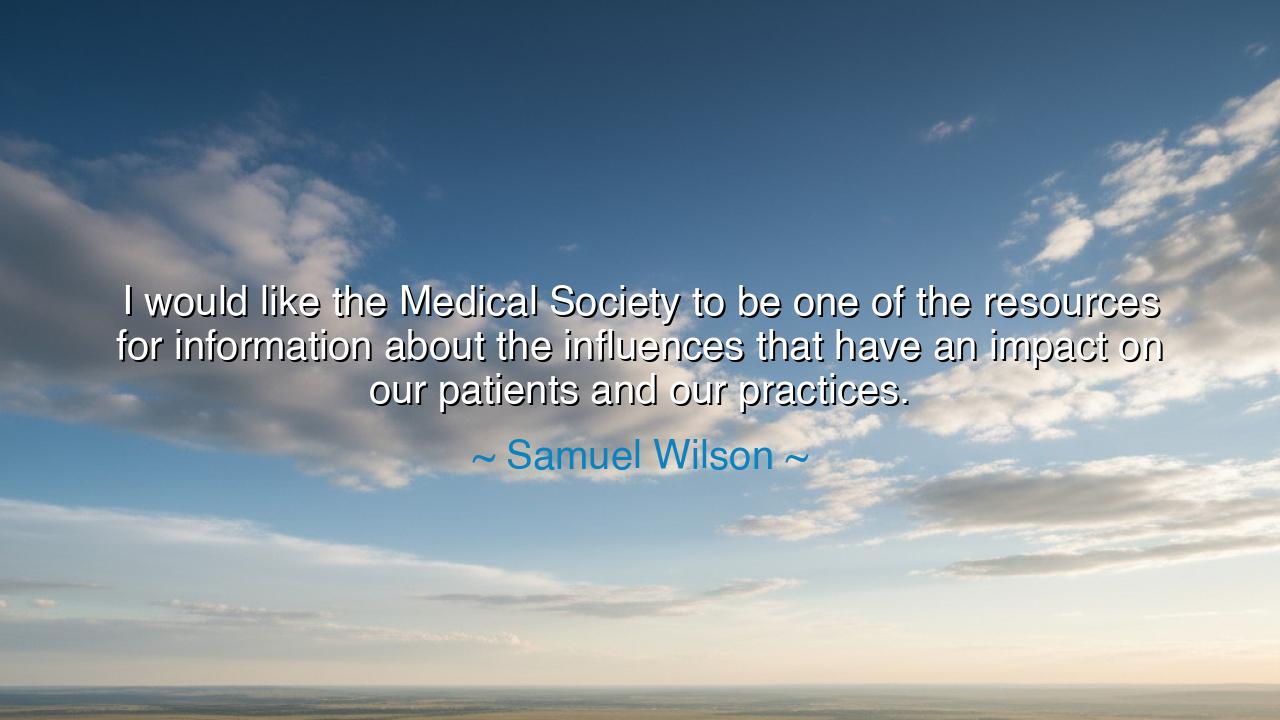
I would like the Medical Society to be one of the resources for
I would like the Medical Society to be one of the resources for information about the influences that have an impact on our patients and our practices.






In the words of Samuel Wilson we hear the voice of one who sees beyond the walls of the clinic and the corridors of the hospital: “I would like the Medical Society to be one of the resources for information about the influences that have an impact on our patients and our practices.” This is not merely the wish of a physician, but the vision of a steward, one who understands that the art of healing does not rest solely in the doctor’s hands, but in the wisdom shared across the whole body of society.
At the heart of his words is the idea of the Medical Society as a beacon of truth. For medicine is not only the application of remedies but the interpretation of knowledge. Patients are shaped by forces far beyond the examination room—by poverty and wealth, by culture and politics, by food, work, and the air they breathe. The physician who sees only the symptom and not the world that created it heals incompletely. Wilson desires that the society of healers be a fountain of information, shining light on these hidden influences, so that both doctor and patient may understand the full nature of health.
The wisdom here echoes the teaching of the ancients. In the schools of Hippocrates, physicians were not only healers of wounds but observers of the seasons, the winds, the waters, and the diets of men. They understood that the body is a mirror of the environment, and that to heal, one must first understand the forces that shape life. Samuel Wilson’s vision is cut from the same cloth: a call for medicine to widen its gaze, to seek not only the cause within the body but also the causes beyond it.
History offers us examples of the power of shared knowledge. When John Snow traced the cholera outbreak in 19th-century London to a single contaminated water pump, he did not act as a solitary genius but as part of a larger awakening in public health. The sharing of information transformed a mysterious scourge into a solvable problem, saving countless lives. Wilson’s hope is for the Medical Society to serve in this same role—as a resource, a guardian, and a guide for both healers and the people they serve.
The deeper meaning of his words is that medicine is not static, nor can it be. New influences arise in every age: industrialization brought new diseases of labor, technology brings new anxieties of the mind, climate change brings new threats to the body. The physician cannot meet these challenges alone. Only when knowledge is gathered, shared, and spread like a great flame through the halls of the Medical Society can the practice of healing keep pace with the ever-changing face of human suffering.
The lesson for us is that healing is a communal work, a covenant of knowledge and compassion. Patients must not be left alone to stumble in ignorance of the forces that shape their health. Physicians must not be left without resources to understand the broader world that impacts their practice. We must all, in whatever role we play, contribute to a society where truth is not hoarded but given freely, where wisdom is not hidden but made a resource for all.
Therefore, take this teaching into your own life. Do not neglect the unseen influences upon yourself or others—whether they be habits, surroundings, or the hidden burdens of life. Seek information, share it with those in need, and honor those who dedicate their lives to the pursuit of knowledge in service of healing. For in this way, the vision of Samuel Wilson may be fulfilled: a society where medicine is not only a practice, but a living light, guiding both healer and patient toward a fuller, wiser, and more compassionate life.






AAdministratorAdministrator
Welcome, honored guests. Please leave a comment, we will respond soon